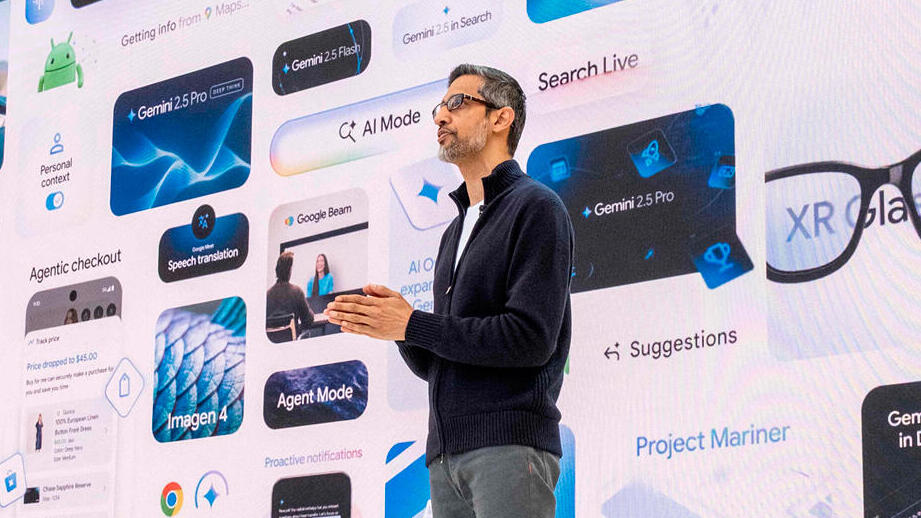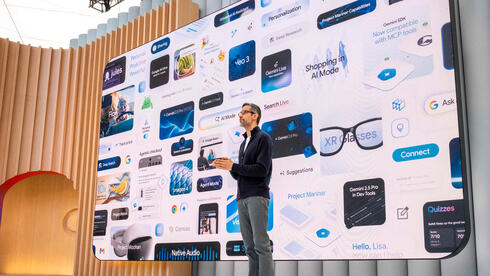
The end of Google Search as we know it
AI integration into Google marks the death of traditional search, and the birth of the chatbot era.
It happened the other day, at the opening event of Google’s annual developer conference. CEO Sundar Pichai took the stage and made an announcement that, while subtle, signaled a seismic shift: the business model underpinning Google’s operations is dead, or at least, that’s what he implied. Because there’s no other way to interpret Google’s main announcement at the event: the integration of artificial intelligence, what it’s calling “AI Mode”, directly into its search engine.
AI Mode is a full integration of Google’s Gemini chatbot into its flagship product. On the search results page, alongside the tabs for images, videos, news, and more, a new “AI Mode” tab will be added. Clicking it opens a conversational interface with Gemini, allowing users to conduct AI-driven searches, receive synthesized summaries, ask follow-up questions, and more. Initially launching in the U.S., this feature is expected to expand globally soon. And its implications are clear: traditional search, the multibillion-dollar engine powered by sponsored links, is on its way out. Long live the chatbot.
Google’s implicit admission that traditional search is fading marks the beginning of a new era on the internet, an era of AI-first search, where the race is on to become to AI what Google was to search. For Google, this means navigating a delicate transition: not only staying relevant to users but also preserving a business model that generated $50.7 billion from “Search and Others” just last quarter.
By integrating Gemini into Search, Google acknowledges that its 27-year-old engine is no longer the go-to tool for many users. Since OpenAI released ChatGPT in late 2022, more and more people have realized that chatbots, not search engines, offer the best answers: fast, concise, contextual.
E., a secretary in her 50s, now turns to Perplexity, an AI search engine. In the background, it identifies authoritative sources, synthesizes their information, and produces detailed responses, sometimes with visuals. E. can even ask follow-ups. She’s far from alone.
“Most people are lazy and hate making decisions. Chat engines fit them like a glove,” said Michael Lugassy, a software engineer at Forter who writes about AI. “You ask a question in natural language and get an answer in natural language, customized, intelligent. I use it for coding, research, product comparisons, and more. I only go to Google for very specific or breaking things.”
Lugassy has deep roots in the search world. Two decades ago, he won an online SEO contest by placing a previously unseen Hebrew phrase, “Latur Motor”, at the top of Google’s search results.
Back then, SEO was the hottest trend in tech. High Google rankings meant big business. But that industry is now in flux. “Real-time search is less important today. Most human knowledge is already in AI models,” Lugassy said. “If I were starting now, I wouldn’t build a search engine. The ad model is changing.”
Related articles:
Chatbots aren’t winning just because they’re good, but because Google search has gotten worse. “Google search is in trouble. It’s become a bad product,” said Revital Salomon, founder and CEO of The Shark Lady, a digital agency. “Users are frustrated. I’m starting to see more visits to my sites from chatbots.”
Still, Salomon doesn’t expect a rapid collapse: “Google will remain dominant in product search and image search. Older users aren’t as comfortable with AI yet.” But she agrees: “Google is clearly in decline. According to Statcounter, its global search share recently dropped below 90% for the first time in years. That’s not because Bing is suddenly hot. It’s because users finally have an alternative.”
For years, Salomon said, Google’s results were subpar. “It rewrites your queries, ignores keywords, and assumes what you meant. That’s intolerable. AI chatbots let you control what’s searched, refine the answers, and dig deeper.”
Still, chatbot search isn’t perfect. “On mainstream topics it’s fine, but for niche queries, it struggles to distinguish credible sources from junk,” she said. “And hallucinations are still a problem.”
The transition to AI-based search introduces major challenges, especially for Google. Search and related ads accounted for more than half its revenue last quarter. Most of that comes from sponsored links, where each click earns Google a few cents, amounts that quickly compound into billions.
But in chatbot-based search, results are presented as summaries. “You get a link to the source, but most people don’t click,” Lugassy said. “If the bot gives you a full answer, there’s no reason to leave. That changes the business model entirely.”
Still, Lugassy isn’t worried for Google. “They’ll adapt. Text and search-based ads may fade, but they’ll shift to video, podcasts, or business tools like enterprise LLMs. Gmail search, corporate data, there’s room to monetize that.”
The real puzzle, he said, is monetizing AI search itself. “Subscriptions like ChatGPT Plus cost $20/month, but that’s not sustainable, it costs more to generate the answers. Eventually, chatbots will include ads.”
These might come as embedded links, highlighted sources that paid for visibility, or even in-chat sponsored paragraphs. “It’s easy to embed personalized ads in chat,” said Lugassy. Affiliate links are another option: search for a product, and the chatbot displays reviews, prices, and a purchase link, earning commission on each sale. Some versions may allow direct purchases from the chat window itself.
Content sites face perhaps the hardest blow. Their ad-driven models rely on users clicking through to their pages. But if AI summarization removes the need to visit the site, traffic, and revenue, plummets.
This calls for new models: subscriptions, licensing data access to AI firms, or both. Some already are. OpenAI has deals with Reddit, News Corp, Condé Nast, and The Atlantic; Perplexity with Le Monde and the LA Times; Google with Reddit and the AP. More niche or expert sites may also be courted as LLMs seek high-quality content across more domains.
Even SEO isn’t dead - yet. “Chatbots still rely on traditional indexes,” Lugassy said. “They perform multiple searches quickly, and high rankings still matter. But OpenAI and others are building their own indexes. Sites will soon need to optimize for AI bots, not just Google.”
Salomon agrees: “You need to write for natural conversation. Long-tail keywords, pros and cons, objectivity, these are what AI models favor. And cite good sources. Original research and balanced analysis may help convince the bot to quote you.”
But, she cautioned, it’s still all speculation. What will AI search look like at scale? Will it be dominated by a few giants, or open and competitive? How will monetization work? And which players will thrive, or vanish into a footnote in a chatbot’s history summary?
Even Gemini and ChatGPT don’t have the answers to that.
